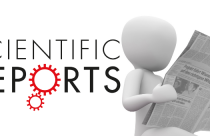2021 in Review: Retrospecting the Year of Redemption and Recourse!

‘Tis the season!—to be grateful to survive the ravaging aftermath that 2020 brought. After grappling with the global COVID-19 pandemic, who’d have imagined any good news coming out of 2021? But with many setbacks came even more opportunities that were seized and turned into marvelous outcomes. Let’s look back at some of the monumental events that took place in research and publishing in 2021.
2021 in Review: Around Enago!
2021 has been a year that transformed research publishing significantly. Here are some major highlights from the publishing industry:
1. Surge in COVID-related Research
Research outputs worldwide increased due to research efforts devoted to the coronavirus. With an aim to create a platform with comprehensive information about the pandemic and avoid spreading misinformation, WHO continues to gather latest international multilingual scientific findings and knowledge on COVID-19. It cites the global literature in the WHO COVID-19 database and updates it daily (Monday through Friday). This data is collated and uploaded from searches of bibliographic databases, hand searching, and the addition of other expert-referred scientific articles.
2. Sharp Rise in Preprints
The global pandemic also fueled a surge in dissemination of COVID-19 research published through preprints due to the time-sensitiveness of the research studies. The scientific community rapidly released over 125,000 COVID-19–related scientific articles, of which more than 30,000 were published on preprint servers such as bioRxiv and medRxiv.
3. Rapid Review
Due to the topicality of COVID-19 related research, journals rushed to get articles through peer review at an accelerated rate. MedRxiv COVID-19 preprints appeared in peer-reviewed journals after a median review time of 72 days, twice as fast as preprints from the server on other topics. However, this pace was observed only for COVID-related papers at the expense of other research being peer-reviewed at a much slower rate. Consequently, other research papers faced the burn of a significantly slower publication rate.
4. Journals Eliminate Misleading Information
Beyond the surge in publications, the pandemic ushered in some unexpected improvements. Publishers and editors of scientific journals streamlined the process, making it more reliable by identifying and eliminating misleading information and poorly conducted research.
5. STM Report on Global Research Trends and Transformation in Open Access Publishing
STM (the Association of Scientific, Technical and Medical Publishers) published the latest edition of “The STM Report”. This report is a comprehensive overview of the scientific and scholarly publishing market. It reveals significant publisher-driven growth in Open Access (OA) and explores the variances across different markets of the global economy.
6. The Open Access Drive
More than 20 organizations, including Wellcome Trust in London, the Bill & Melinda Gates Foundation in Seattle, Washington, and Dutch national funder NWO, started stipulating that scholarly papers published from the work they fund must be immediately free to read. The 2-year-old initiative, called Plan S, brought a revolution in Open Access publishing. It ended the spell of journal subscriptions and made scientific literature easily accessible to all.
7. Clarivate’s Journal Citation Indicator (JCI) Identifies the World’s Leading Journals
While Clarivate has been publishing its Journal Citation Report for over 50 years now, this year they went a step ahead by launching a new and more reliable metric system called the Journal Citation Indicator (JCI)—an alternative single journal-level metric that can be easily interpreted and compared across disciplines. It uses a range of indicators, descriptive data, and visualizations to analyze and present the data.
2021 in Review: At Enago!
At Enago, we look forward to achieving new milestones every year; and with the support of readers and subscribers like you, we could find the silver lining even during the pandemic. Thus, keeping up with the theme, here are the highlights from Enago’s journey of 2021.
1. Enago Leaps into the AI World: Launches 2 Tools for Researchers
-
Enago’s Plagiarism Checker and AI Grammar Checker
Enago launched the first-ever automated plagiarism checker for researchers with an AI-based grammar checker. It is a cost-effective tool for quick, comprehensive, and reliable plagiarism check, that helps researchers in assessing their manuscript’s originality by providing a color-coded plagiarism report with plagiarism percentage. It has an extensive scholarly database of over 91+ billion web pages and 82+ million published articles. The plagiarism checker is accompanied by an AI-based grammar checker that detects grammar errors and suggests corrections and language enhancements tailored for academic writing. Additionally, its power editing mode enhances research papers by correcting sentence structure, word choice, and subject-specific phrasing.
-
“Review Assistant”: An AI-powered Tool for Peer Reviewers
Another major milestone at Enago was the launch of Review Assistant—a pioneer AI-based tool for peer reviewers. This tool facilitates the peer review process with its unique features that help researchers and publishers with literature review, critical reading, concept extraction, semantic knowledge mining, content discovery, and recommendation. Review Assistant is one of the most efficient tools for researchers looking to get into peer reviewing at all stages of their career.
2. Enago’s Active Participation in Global Events
-
At the Forefront of Peer Review Week 2021
With a motive to curate a unique and intellectually stimulating ensemble for researchers worldwide, Enago participated in the Peer Review Week 2021 as a core member of the organizing committee. Multiple teams at Enago came together and brainstormed to bring out the best versions of exclusive activities throughout the event week.
In line with this year’s Peer Review Week theme— “Identity in Peer Review”, Enago explored the multifaceted roles of identities in the peer review process that brings diversity, expectations, perspectives, experiences, knowledge, and skills together. The participation of over 4000+ researchers from across the globe, validated our effort and elated us. Overall, the event was commingled with facts, insights, opinions, collegiality, and an aspiration of a progressive future.
-
International Open Access Week 2021: Enago Shares Light on Building Structural Equity with Open Knowledge
Supporting the Open Access drive, Enago also participated in the Open Access Week 2021 and shared insights on the theme—It Matters How We Open Knowledge: Building Structural Equity. The organization aims to take action around this year’s theme whenever is most suitable during the year and to adapt the theme and activities to their local context.
3. See the Future Conference
In its second year, Enago’s See the Future virtual conference highlighted the future trends of research and publishing, and the aspects that will augment it. It is a one-of-a-kind global conference, with yesteryear’s Nobel Laureate Professor Randy Schekman as the keynote speaker. The conference focused on vital aspects of research publication with its exclusively curated sessions by eminent researchers across the globe.
4. Launch of Two Global Surveys
-
Global Survey on Research Labs Health
As a part of its Global Research Risk Assessment initiative, Enago conducted a survey to understand the impact of COVID-19 on research laboratories across the world and how researchers are working in laboratories during the pandemic. Enago conducted the survey over a period of 16 weeks between October, 2020 and February, 2021. Over 1400+ researchers across 40 countries globally participated in the survey.
-
Global Survey on Role of AI-based Tools in Academia
Given the influence of AI automation and tools on researchers, Enago conducted a global AI survey to comprehend and evaluate the role and impact of AI on the research and publishing field. With over 212 universities participating from around 52 countries, we awarded 10 participants who shared insightful responses to the survey.
These are some of the major achievements for us this year! With your support, we aspire to bring to you a knowledge packed 2022! Happy Holidays from us all at Enago Academy!









